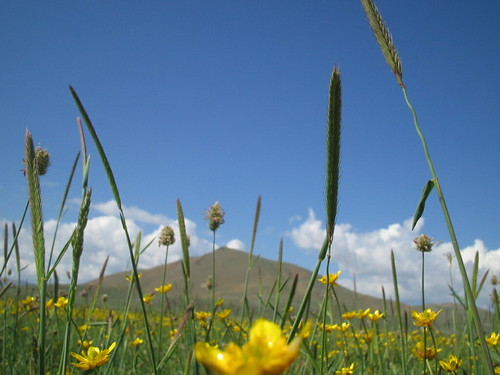The morning glory climbs above my head,
Pale flowers of white and purple, blue and red.
I am disquieted. Down in the withered grasses something stirred;
I thought it was his footfall that I heard.
Then a grasshopper chirred. I climbed the hill just as the new moon showed,
I saw him coming on the southern road.
My heart lays down its load.
—"The morning glory climbs above my head" by Helen Waddell (Houghton Mifflin Company, 1913)
Yesterday I was going through old notes from my writing while at The University of Nigeria at Nsukka, and I came across Waddell's translation, which I'd copied out by hand. In those days before Google and ready cut&paste, I used to do a lot of copying out poems I found and loved. This lovely poem, a translation of a translation from the Book of Odes, was originally published with the note "Written in the twelfth century before Christ, c. 1121," and demonstrates once again that extraordinary facility that's blessed Asian poetry through the ages of taking the broad sweep of Nature and tacking it lightly onto the human experience, such as compelled Ezra Pound to toil over Fenollosa's notes to produce Cathay. Of course that's what many European Classic poets tried to do in pastoral efforts, but generally ended up being so much more heavy-handed with political and academic statement than their Asian counterparts. That's what the European Romantic movement poets tried to do, but also without much subtlety or delicacy.
The modernist movement in Europe seems to have unfortunately banished this sort of expression entirely, and that is a major tragedy. Even among poets working to reinstate metrical verse to contemporary practice, there seems to be some inexplicable terror of abstract and natural themes. This is a shame, but I'll take what I can get, and yesterday I also came across "The Wind with its Smell of Flower," a wonderful translation from Mongolia's Poet Laureate G. Mend-Oyoo by Simon Wickham-Smith and Lyn Coffin.
I love this peaceful blue evening
It is absolutely a castle of the East
I love this cloud with its golden mane
It is absolutely a lantern of the East
I love this wind with its smell of flowers
It is absolutely the fragrance of the East
—from "The Wind with its Smell of Flower," translation from G. Mend-Oyoo by Simon Wickham-Smith and Lyn Coffin in Qarrtsiluni
If you read Mongolian, I'd guess you are very lucky to be able to read the original "ЭНЭ ЦЭЦЭГ ҮНЭРТСЭН САЛХИ." And while at Qarrtsiluni be sure to check out "The Man in the Yellow Coat/L’Homme au Pardessus Jaune" by my friend M.J. Fievre, a stunning story both in the original French/Creole and in the English translation made by the author. I'll repeat in public something I remarked to the author in private:
You say "While the omniscient P.O.V is admissible in Haiti, a country known for its oral tradition, it was frowned upon in American literature." I'm not much for American fiction but that startled me. If it's true, it probably helps explain why I'm not much for American fiction.
For me banning the omniscient narrator from story-telling is like banishing the color black from visual art. Or hey! maybe like banishing abstraction and nature from poetry. Shame on any MFA departments and workshop people involved in such heresy.
By the way, my title for this posting includes some poetic license. More accurate to my point would be something such as "Ou sont les idylles bucoliques d'antan," but that doesn't sound nearly as nice.



